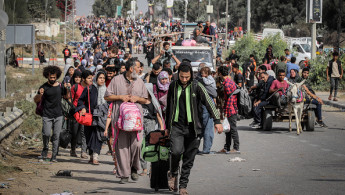Palestinians forcibly displaced from north Gaza describe 'journey of fear and death'
Tens of thousands of Palestinians from Gaza City and the north that were forcibly displaced by the Israeli army have finally arrived in the central and southern regions of the besieged coastal enclave after an arduous journey that many describe as one of "a struggle against death and fear."
Since last week, as the Israeli army occupied Gaza City surroundings and northern parts of the enclave, around 200,000 Palestinians have been forced from their homes amidst continuing Israeli air, ground and sea attacks, according to Palestinian and Israeli official figures.
The Israeli army claimed that it established two safe "humanitarian corridors" for civilians to flee the fighting - the first, along the Salah al-Din road, which links the northern and southern governorates in the territory, while the second is along the sea road in the west of Gaza.
At the time of writing, trucks, cars, and donkey-drawn carts continued to pass, while many others travelled on foot
Palestinians who took these routes describe to The New Arab a horrific experience, with several speaking of how the Israeli army had killed several young men and arrested others, in full view of everyone.
"Israel established the so-called safe corridors to obtain humiliating pictures of displaced Palestinians and gain some satisfaction for its audience thirsty for Palestinian blood," one survivor remarked to TNA.
"We felt as if we were in a mousetrap. Everyone was afraid. Will we be killed? Will our bodies mutilated in front of the world? Or will we be arrested and taken to an unknown fate?" Mohammed, a 36-year-old man who survived the route, remarked to TNA.
"It was a race with death as the Israeli army forces directed their weapons at us. They killed some of the displaced people while they arrested others," he said.
Mohammed further said to TNA, "All those fleeing, including journalists, patients, women, children and elderly people, were desperate and tried to rush each step because we wanted to reach any safe area."
Following long hours of walking on their feet, thousands of displaced people eventually arrived in the middle and southern parts of the war-torn coastal enclave.
Thousands of families have squatted on both sides of the main road in the central Gaza Strip. Everyone is tired, some are dripping with sweat. Children are sleeping on dirt, others cling to their mothers.
Most of the Palestinians displaced from the north do not have any accommodation or relatives to host them. In response, residents of the area stormed universities, forcing them to host women and children while the men slept on sidewalks.
Ahmed al-Atrash, a displaced resident from the al-Tufah neighbourhood in Gaza City, slept for three nights on the sidewalks in Rafah City, south of Gaza.
"We are all alone in this unprecedented battle. No one cares that our lives are completely turned upside down and that we would forget dozens of our relatives killed without even committing any fault in their tragic life," the 54-year-old father of seven said to TNA.
"Israel is trying to force us from our homes not to fight Hamas but to create a new reality on the ground and to force us to evacuate our country," he added. "But we will never leave Gaza and give it to Israel freely… We evacuated our houses to save our children and women from Israeli crimes, but we will not leave the strip."
The massive influx of people fleeing Israeli attacks has also increased the rates for rent in the southern parts of the enclave.
"Rates of rental houses increased from US$150 to US$1,000 in southern areas, labelled as "safe areas" according to Israeli claims," Yousef, another displaced, noted to TNA.
"We left our houses without bringing anything with us. We neither have the money nor any chances to keep our families afloat or even live in safe accommodations," the 60-year-old man of six said.
"My wife is sick, and my daughter and I were injured when Israel bombed a neighbouring house, and our house was destroyed. We have been besieged for 25 days without eating, drinking, or anything," Yousef added. "We were under bombardment every second. The shells did not stop, and belts of fire surrounded us. We were afraid that the remains of the house would fall on us due to the intensity of the bombing and shaking, so we decided to come to the south."
But their suffering is not just limited to the there.
The Israeli army claims that these areas are "safe zones", but nevertheless continues to target these sites, killing and wounding hundreds of people who had escaped the north. The ever-present fear of Israeli air strikes looms large for everyone.
Nearly half of the homes in the Gaza Strip have been destroyed or damaged by Israel, ensuring that more than 1.5 million Palestinians are displaced, according to the United Nations.
Despite this harrowing fact, once Israel ends its more, all those who spoke to TNA — Mohammed, Yousef, Ahmed and others — vowed to return to Gaza City, even if it was on their own two feet.




 Follow the Middle East's top stories in English at The New Arab on Google News
Follow the Middle East's top stories in English at The New Arab on Google News

![A group of Palestinians, foreign and Israeli activists gather to participated in an olive picking event on the land in the town of Battir, which is under threat of confiscation by Israel in Bethlehem, occupied West Bank on 8 November 2024. [Getty]](/sites/default/files/styles/image_330x185/public/2182930803.jpeg?h=199d8c1f&itok=__0LgGsa)
